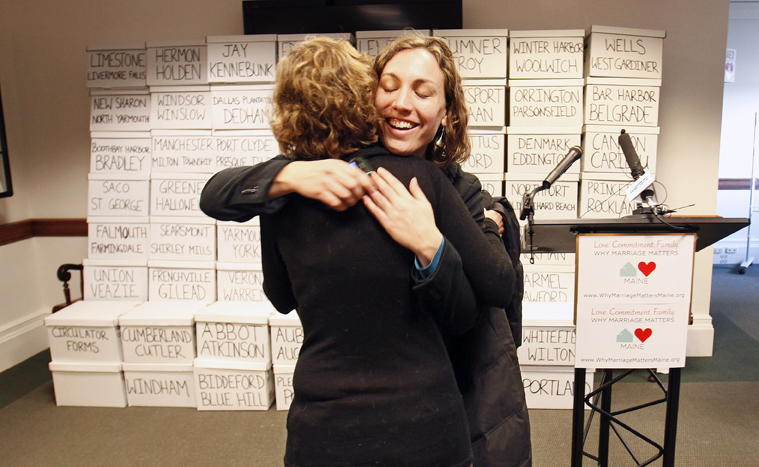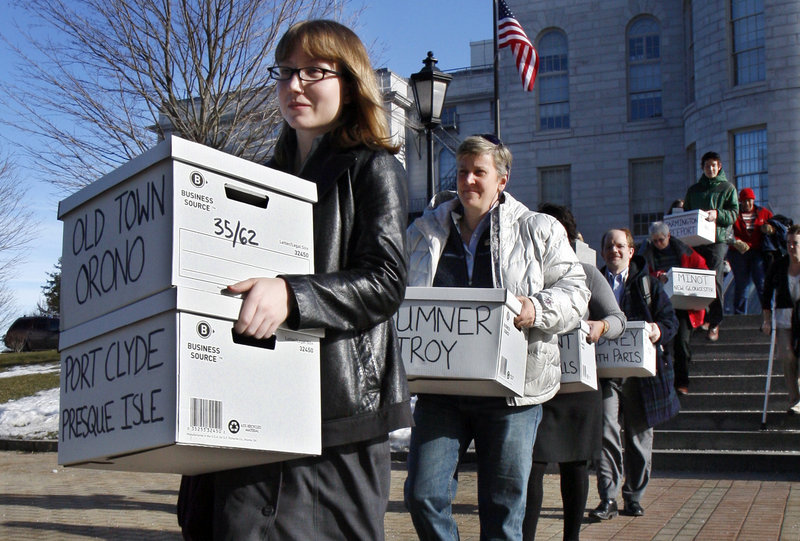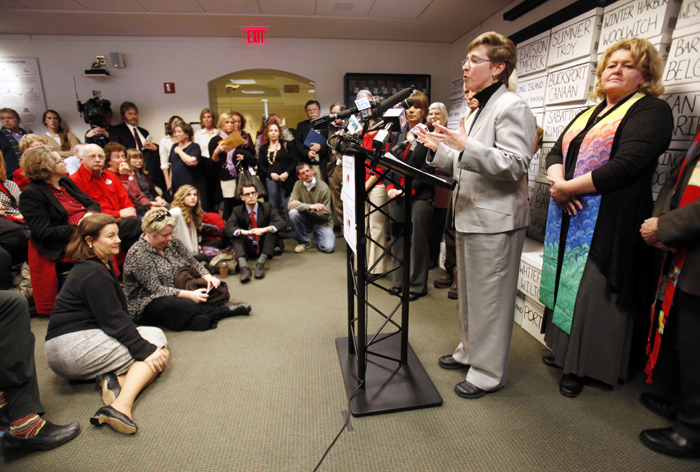AUGUSTA — Advocates of gay marriage submitted more than 105,000 signatures to the Secretary of State’s Office on Thursday to begin what’s expected to be a long and passionate debate over the right to marry in Maine.
Dozens of advocates packed the small State House Welcome Center to announce their intention to get a question on the statewide ballot in November. In 2009, Maine voters overturned a law passed by the Legislature to allow same-sex marriage.
“This denial of marriage continues to be a very painful part of our lives,” said Betsy Smith, executive director of EqualityMaine. “The need for marriage has not gone away since 2009.”
Smith said the decision to seek another referendum this year was driven by several factors, including polling done for the advocates in December that showed 54 percent of 800 likely voters favored allowing same-sex marriage.
She also cited this year’s presidential election, which will boost voter turnout; advocates’ meetings with voters to gain support; an organized coalition that includes EqualityMaine, the American Civil Liberties Union of Maine and the Maine Women’s Lobby; and the belief that proponents of gay marriage will have the money it takes to win at the polls.
Opponents said they are disappointed that voters will have to address the issue again but they, too, are ready.
“After the bitterly divisive campaign of 2009, in which Maine people clearly and decisively voted against changing the meaning of marriage, we’re dismayed that they would bring this issue back for yet another vote,” said Brian Souchet of the Roman Catholic Diocese of Portland, in a prepared statement. “Marriage is an institution that cannot be arbitrarily redefined to accommodate adult desires for public affirmation or state-sponsored benefits.”
Gay-marriage supporters turned in more than 75 boxes of petition signatures to the Secretary of State’s Office, which now has 30 days to confirm that there are at least 57,277 valid signatures of registered voters – 10 percent of the turnout in the last gubernatorial election.
The verification process is seen as just a formality at the State House, where the Legislature’s response to the initiative is already being discussed.
Lawmakers could adopt the gay-marriage proposal or send it to referendum. The advocates made it clear that they are aiming for a vote by Maine citizens.
Three years ago, they focused much of their effort on winning legislative support. This year, with Republican majorities in the House and Senate and a Republican governor who has said he opposes gay marriage, they hope to go directly to voters.
David Hastings, R-Fryeburg, Senate chairman of the Legislature’s Judiciary Committee, said there have been preliminary discussions about whether the Legislature should hold a public hearing or just let the bill go to the ballot.
He said legislative leaders and rank-and-file lawmakers will have to decide whether it makes sense to spend time on a hearing when, ultimately, the issue will go to the voters.
“If there’s going to be a public hearing, it will be another (Augusta) Civic Center spectacle that will bring out thousands,” Hastings said. “It’s inevitable it will end up on the ballot.”
At Thursday’s press conference, gay-marriage supporters laid out the reasons for Maine to join the six states that allow same-sex couples to marry – including Massachusetts, New Hampshire, Connecticut and Vermont.
Lucie Bauer of Rockport said she and her partner felt so strongly about their relationship that they went to California in 2008 to get married.
“We regretted that we had to travel so far from our children, our family and our closest friends in order to legally marry,” she said. “The two of us hope one day our marriage certificate will be honored here in our beloved home state of Maine.”
In written materials circulated to the press, EqualityMaine emphasized the importance of state and federal laws that benefit only couples who are legally married.
The Rev. Michael Gray of the Old Orchard Beach United Methodist Church spoke at the press conference about his transformation from an opponent of gay marriage to a supporter. He emphasized that the ballot question would preserve the rights of churches and other religious institutions not to perform same-sex marriages if doing so conflicts with their beliefs.
“Churches and clergy in the state of Maine will continue to operate in the same way they do today,” he said. “No church or clergy member will ever be forced to perform marriages that go against their religious beliefs.”
The Rev. Bob Emrich of the Emmanuel Bible Baptist Church in Plymouth, one of two leaders of the opposition to gay marriage in 2009, said weddings performed in churches are just a small part of the issue.
“The implications reach into so many different areas we feel it’s important that tradition be preserved,” he said. “We’re not advocating that people not be allowed to live together, to love each other. Why do we want to change by balloting what marriage actually is, what it means?”
Emrich said he has not seen evidence that large numbers of Mainers have changed their minds since 2009 and, in fact, opponents of gay marriage may have additional support. Part of that comes from the response to an advertising campaign run by EqualityMaine last year, he said, and from “here-we-go-again backlash.”
Whether the tide has turned in Maine is an open question, said two political science professors.
“I don’t think it’s a sure bet for either side,” said Jim Melcher of the University of Maine at Farmington. “The (same-sex) marriage side will do better. Whether that’s enough to win, we’ll have to wait and see.”
Marvin Druker, a professor at the University of Southern Maine’s Lewiston-Auburn campus, said across the country there appears to be a “slow increasing tolerance for same-sex marriages.” He’s not sure whether that’s the case in Maine.
“Whether it’s 50 percent plus one, we’ll see,” he said.
Souchet, director of the Catholic diocese’s Office for the Promotion and Defense of Marriage, said polling on the topic is often flawed, with voters telling pollsters what they want to hear. It’s a different story once people get in the voting booth, he said.
A poll in late October 2009, just before the referendum, showed gay marriage with 53 percent support in Maine. On Election Day, voters rejected it 53 percent to 47 percent.
“The biggest mistake they can make is believing their own polling,” Souchet said in an interview.
The diocese donated more than $500,000 to oppose gay marriage in 2009. Souchet said he doubts it will spend that much this time but it’s too early to say for sure.
Smith, of EqualityMaine, said gay-marriage supporters expect to spend $4 million to $5 million on the campaign.
In 2009, supporters of same-sex marriage spent $5.8 million while opponents spent $3.8 million. Those totals include the official campaigns and other groups that spent money to support or oppose the ballot question, which asked voters to reject the law passed by the Legislature.
Carroll Conley, executive director of the Christian Civic League of Maine, said his group will be more active in this campaign than it was in 2009. He said tradition and history show that marriage between a man and a woman is best for families.
“Various cultures and faiths have recognized it as the ideal,” he said. “That needs to be protected and strengthened, not undermined.”
But Lee Swislow, executive director of Gay & Lesbian Advocates & Defenders, said committed gay couples should be allowed to marry. She said she didn’t realize the power of marriage until she wed her partner in Massachusetts in 2004.
“I felt the difference in how we were treated,” she said. “We were married and everyone knows what that means. And I felt a new kind of respect for our relationship.”
MaineToday Media State House Writer Susan M. Cover can be contacted at 620-7015 or at:
scover@mainetoday.com
Send questions/comments to the editors.




